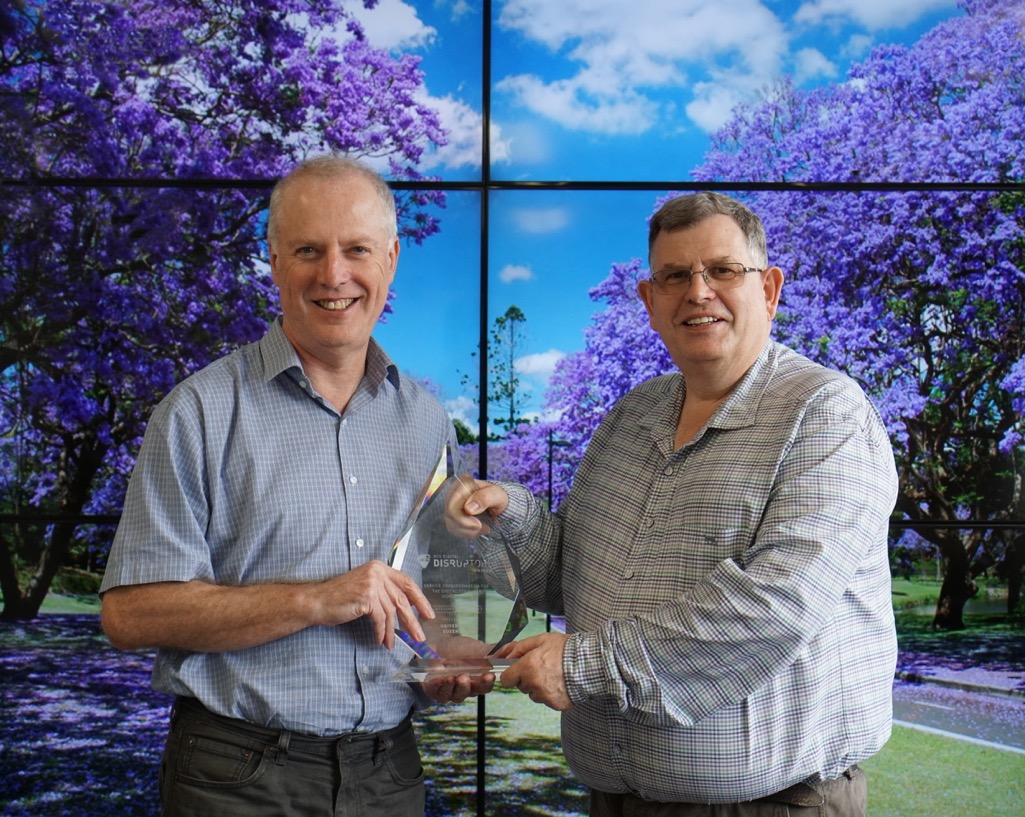
Each year is busy, but 2017 was especially so for RCC as the team delivered even more new advanced compute infrastructure to support UQ’s researchers. We also won a few awards for our efforts, which was nice. Keep reading for a summary of RCC’s activities in 2017.
Infrastructure
RCC led development of dedicated computing and storage infrastructure to handle the big data volumes expected to be generated by UQ’s revolutionary Lattice Light Sheet Microscope (LLSM), which was installed in the Institute for Molecular Bioscience (IMB) in September this year.
RCC developed a new supercomputer to support the LLSM. Wiener is designed specifically to accelerate extremely high-resolution image processing from microscopy facilities. Wiener was recently installed at the Queensland Brain Institute and is currently being tested. It is expected to become fully operational in February 2018.
RCC also developed data visualisation software to handle LLSM’s large data volumes. Phoebe provides a simple interface allowing researchers to analyse the microscopy data as a 3D interactive movie.
Once captured on the LLSM, the data will be stored and made available via MeDiCI (Metropolitan Data Caching Infrastructure), a RCC-developed high-performance data storage fabric, which became fully operational this year.
In other supercomputing news, Euramoo was rebuilt this year as a new high-performance compute cluster called Awoonga. Awoonga began operating in August and was designed to be easier for researchers to use, and to be compatible with existing research HPCs FlashLite and Tinaroo to enable researchers to work seamlessly across the clusters.
RCC was involved this year in the development of a new, world-leading system in collaborative research data management infrastructure at UQ. The UQ Research Data Manager, launched earlier this year, has been built to be researcher-centric and user friendly.
RCC also engaged with the Zooniverse project this year. Zooniverse is the world’s largest platform for volunteer-powered research with potentially hundreds of thousands of people worldwide assisting professional researchers.
RCC invited Campbell (Cam) Allen, a core developer in the Zooniverse team at Oxford University, to be a guest at UQ’s Hacky Hour on Tuesday, 4 April. It was Hacky Hour’s largest turnout yet with about 20 people from UQ and QUT dropping in to speak to Cam.
RCC also helped UQ’s Centre for Advanced Imaging to be the first at UQ to use Zooniverse in its research. RCC is keen to help other researchers with potential citizen science projects (contact: rcc-support@uq.edu.au).
Awards
In November, RCC won an Australian Computer Society Digital Disruptors Award for its MeDiCI project. In June, RCC received a merit award at the Queensland iAwards for significant innovations around data-intensive infrastructure, in particular for MeDiCI and HPC FlashLite.
Not an award as such, but still a big win: RCC won a place in this year’s Huawei Research Innovation Program Open (Huawei HIRP Open 2017) for a project aiming to significantly aid global data sharing and massive data analysis, based on RCC’s MeDiCI work. Work on this project will begin in 2018.
In Washington D.C. in June, RCC Director Prof. David Abramson received the annual High Performance Parallel and Distributed Computing (HPDC) Achievement Award for his pioneering research in the field.
Events
This year’s RCC Seminar Series had an Asia focus and featured a handful of speakers from some of the best institutions in Asia discussing their technology-focused work. View the videos from the seminar series on RCC’s YouTube channel.
RCC hosted the Pacific Rim Application and Grid Middleware Assembly (PRAGMA) workshop in October, co-located with the eResearch Australasia conference.
RCC is currently busy preparing to host Australasian Computer Science Week 2018 (ACSW 2018) at UQ’s St Lucia campus next year from 29 January to 2 February.
RCC Director Prof. David Abramson had a very busy year this year chairing two October conferences, including eResearch Australasia 2017 in Brisbane, and international conference eScience 2017 in Auckland. He is also preparing to chair ACSW 2018, and handling the work involved in being on high-level committees for HPC Asia 2018 and Supercomputing Asia 2018, all of which will take place early next year.
Conclusion
Overall, this year was an exciting time for RCC, and we look forward to continuing to deliver the best possible technological infrastructure to support UQ’s researchers.



